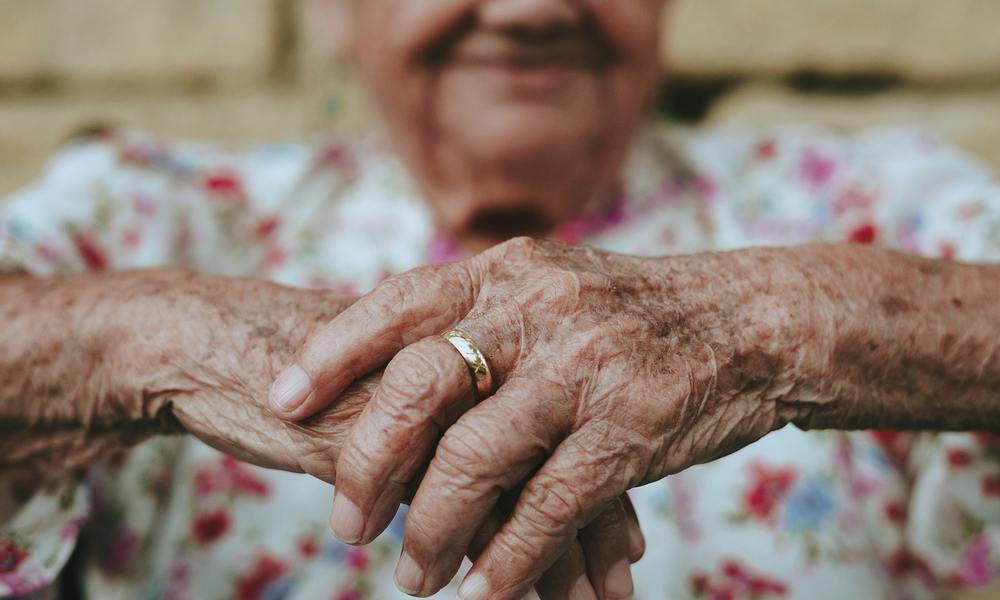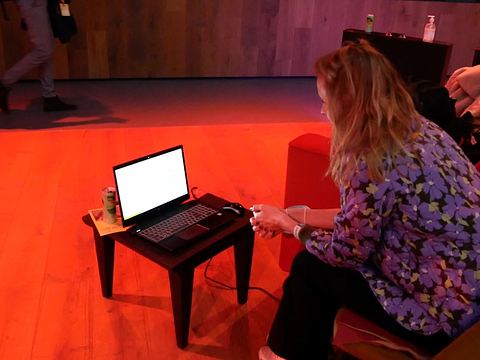MOOD-Sense
Watch the video- Research project

Residents of nursing homes with dementia commonly exhibit challenging and misunderstood behaviours, such as restless pacing, swearing, fidgeting or wandering. How can sensor technology help to predict that kind of behaviour? The MOOD-Sense project (MOnitoring Misunderstood Behaviour in Dementia with Sensor Technology) is working with healthcare professionals to look at how sensors can help in dementia care. Sensors can help detect physiological signs of common misunderstood behaviours in people with dementia.
The shortage of staff in healthcare is a growing problem. Technical solutions can provide a solution. One such solution is using sensors to develop an early warning system for people with dementia in nursing homes. Sensors alert nurses when the patient exhibits problematic behaviour such as wandering off or aggression. This is helps both residents and staff. Care workers do not have to constantly keep an eye on residents, and residents have more privacy.
The research is a collaboration between research institutions and care organisations in the Northern Netherlands, including Hanze University of Applied Sciences Groningen, Universitair Netwerk Ouderenzorg UMCG (UNO-UMCG) and Zonnehuisgroep Noord. The research started in September 2020 and an initial pilot is currently running in a Zonnehuisgroep Noord institution.
To create a great product, it's important to learn from real-life experiences. That's why the researchers in this project began by working closely with care professionals. These professionals take care of people with dementia on a daily basis, and they have a wealth of knowledge about the different aspects and signals of misunderstood behaviour. Sadly, many scientific studies overlook this valuable insight.
It's important to remember that each patient is unique. For example, Mr. de Wit may display different warning signs compared to Mrs. de Bruyn. This means we need to approach their behaviors differently to provide effective treatment. Our researchers closely observed how healthcare professionals handle misunderstood behavior in specific patients. We used these insights to develop a sensor technology.
Using pilot tests, this technology was fine-tuned. The aim of MOOD-Sense is to create a system that can effectively predict challenging behaviour in dementia patients. But the project doesn't stop there. We also want to use the findings to develop training programmes for care professionals and students. This includes those studying in mbo and hbo programmes. We want to ensure that future caregivers are equipped with the necessary knowledge and skills to handle misunderstood behavior effectively. Additionally, we'll train care professionals on how to use sensors to detect and address misunderstood behavior.
By combining real-life experiences, cutting-edge technology, and comprehensive training, we aim to make a positive impact in the lives of dementia patients and their caregivers.
This project will bring about significant positive changes for older people with dementia, ensuring they have a safer and improved living environment. Moreover, it will have a significant impact on the education and training of care professionals.
The sensor technology developed in this project can also be adapted for various other applications in the field of healthcare, including areas like sports performance.
The initial results of the project are highly promising, and it has even led to the creation of a student project called the E-motion chair. This innovative sensor cushion has emerged as a result of our research.

The research project MOOD-Sense – MOnitoring Onbegrepen gedrag bij Dementie met sensortechnologie – is a unique collaboration between knowledge institutes, elderly care organisations in Groningen and Drenthe, and other companies in the region. You can find a list of partners below.

Lector Sensors & Smart Systems
Zernikeplein 11, 9747 AS Groningen
Are you a care professional who would like to learn more about this technology? Or do you work with sensortechnology already, and do you want to share your experiences? Contact us!
Contact usHow satisfied are you with the information on this page?